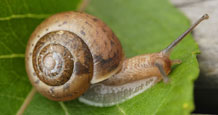
Snail
University study uncovers the secret lives of UK garden snail
Researchers track nocturnal snail activity for the first time, using LED lights and time-lapse photography. Snails were tracked over 72 hours, with researchers measuring their speed, distance travelled and exploration habits. Snail numbers have risen in recent years due to favourable breeding conditions. Slugs and snails can carry the lungworm parasite, Angiostrongylus vasorum, which is potentially fatal to dogs.
A ground-breaking study of UK snail behaviour using LED and UV light tracking has found that the nocturnal creatures can explore the length of an average British garden in just one night, reaching a top speed of one metre per hour.
Dr Dave Hodgson, Associate Professor of Ecology from the University of Exeter, led the research which studied the habits of 450 garden snails, recording their movements using LED lights and UV paint. This is the first time snails have been studied in this way, creating some unexpectedly spectacular images. The research fed into the ‘Slime Watch’ report and documentary, commissioned by the Be Lungworm Aware campaign.
Dr Hodgson said:“The findings reveal how snails will travel distances of up to 25 metres in a 24-hour period, and seek out areas of shelter, such as long grass, trees or objects, including dogs’ toys, left in the garden overnight. We also discovered that snails move in convoys, piggy-backing on the slime of other snails to conserve energy. It is thought that a snail could use up to 30 per cent of its energy in slime production alone.”
The study was commissioned as a resource for dog owners, whose pets are at risk from a potentially fatal parasite spread by slugs and snails, the lungworm Angiostrongylus vasorum. The parasite is contracted when dogs accidentally swallow even the smallest slugs or snails, which can be found in dog toys, puddles and long grass.
In recent years, slugs and snails have enjoyed a population explosion due to increasing wet weather and favourable breeding conditions. Last year, the Royal Horticultural Society reported a 50 per cent increase in slug numbers. Slugs and Snails also topped a list of the top 10 garden pests in the UK, in findings published by the RHS for 2012.
But the risk is much more severe for dogs, with the rise in snails facilitating a spread of the fatal lungworm parasite. A recent survey suggests that lungworm is now endemic throughout much of the UK. 150 veterinary practices across the UK were questioned and between them reported a total of 952 suspected cases with 81 deaths thought to have been caused by the parasite.
Evidence from the Royal Veterinary College confirms that the parasite has spread from its traditional habitat in the south, to more northerly regions as far as Scotland, with one in five vet practices reporting at least one case of the parasite.
Date: 23 August 2013
